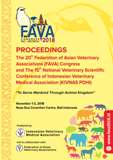JSPS-7 Bovine Respiratory Syncytial Virus Infection Enhances Pasteurella multocida Adherence on Respiratory Epithelial Cells
Abstract
Bovine respiratory syncytial virus (BRSV) is a single negative-stranded RNA virus belonging to the Paramyxoviridae family and shows a close genetic relationship with human respiratory syncytial virus (HRSV). BRSV is the primary etiological agent of respiratory disease in calves aged up to 12 months [1]; beef and dairy cattle worldwide [2, 3]. Initial infection by BRSV alter bovine immune system and facilitates secondary infection of the lower respiratory tract by bacteria [1, 4]. Therefore, BRSV is considered to be a causative agent of bovine respiratory disease complex, which results in economic losses to farmers because of the morbidity and mortality in cattle [2, 3]. According to our preliminary findings based on the gene detection from respiratory samples, paired virus and bacteria were detected; Pasteurella multocida (PM) was the most common bacterial agent (unpublished data). PM is common in the nasopharynx of cattle [5, 6], although PM appears to be part of the normal flora, it can contribute to pneumonia when cattle stressed and/or infected by a respiratory virus [7]. However, the interactions between multiple agents associated with BRDC are not clear. Therefore, the aim of this study was to investigate the effect of BRSV infection on PM adherence to respiratory epithelial cells.

